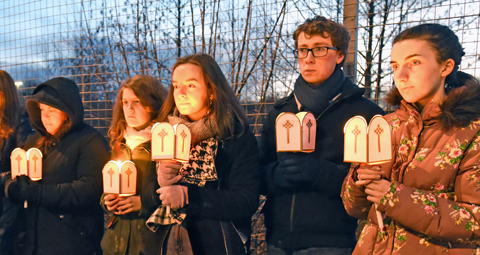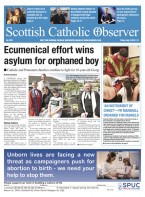BY Peter Diamond | July 6 | ![]() 0 COMMENTS
0 COMMENTS ![]() print
print

Church slams Glasgow council vote to consider ban on hospital pro-life vigils
The Church has slammed Glasgow City Council’s decision to consider banning pro-life vigils outside hospitals and clinics.
On Thursday June 29, at a full council meeting, cross party support was given to a motion seeking advice about legal powers which would be used to establish ‘buffer zones’—a ban on all prayer vigils and pro-life movements from peacefully protesting outside Glasgow hospitals and health clinics. The council now plan to consult health officials, police and Scottish Government about the proposals.
This week the Catholic Church has criticised the plans, branding them a move to silence anyone who wishes to speak in favour of the unborn.
Anthony Horan, director of the Scottish Catholic Parliamentary Office, said: “We should be deeply troubled by this latest proposal which seeks to remove and silence those who speak up for women and their unborn babies.
“The right to life is the most fundamental human right. Sadly, those in positions of power repeatedly fail to protect the weakest and most vulnerable among us—the unborn.
“Individual groups who bear witness to the devastating effects of abortion are entitled to gather peacefully in public spaces.
“This is a fundamental right and politicians representing the people of Glasgow, cannot, in good conscience support such restrictions on freedom and local democracy.
It is also extremely concerning that the 40 days for life Glasgow group was so blatantly and grossly misrepresented by the council.”
40 Days for Life organise vigils during Lent outside hospitals in Glasgow and Dundee.
SNP Councillor Elaine McSporran, who proposed the motion aimed at preventing ‘protests’ directly outside health facilities, claimed some pro-life groups made women feel ‘harassed’ and ‘intimidated’ when attending for treatment.
The motion ‘noted with concern the escalation in demonstrations at NHS facilities, especially activity targeted at women and staff attending sexual and reproductive health services. Council further notes the distribution and display of misleading information and distressing images which can intimidate women and jeopardise access to legal healthcare services.”
Glasgow City Council members agreed that people have a right to peaceful protest, but said it shouldn’t interfere with women’s fundamental rights to make individual reproductive choices or subject NHS professionals to fear and abuse.
Councillors read statements claiming that constituents had told them how women felt ‘harassed’ and ‘frightened’ when faced by anti-abortion campaigners outside health premises.
Council members claimed ‘this led to heightened stress at an already physically and emotionally difficult time.’
One councillor also claimed that some NHS staff had been verbally abused as they went about their work.
A spokeswoman for Society for Protection of Unborn Children (SPUC) Scotland, said: “It is appalling that Glasgow City Council would support such an infringement on people’s freedom of speech.
“Throughout the council’s discussion, councillors regularly mischaracterised the nature of these vigils. There have been no convictions for harassment at these vigils; there is no evidence to support the assertions these councillors made—they are simply untrue.
“This motion is just another attempt to silence the pro-life message in the public sphere. Instituting a ‘buffer zone’ is a direct attack on democracy and freedom of speech. Pro-life people are being targeted for their desire to present an alternative to abortion.”
SPUC Scotland say that it will work in whatever ways it can to prevent the implementation of ‘buffer zones’ and are considering all the ways in which fund freedom of speech is protected.











